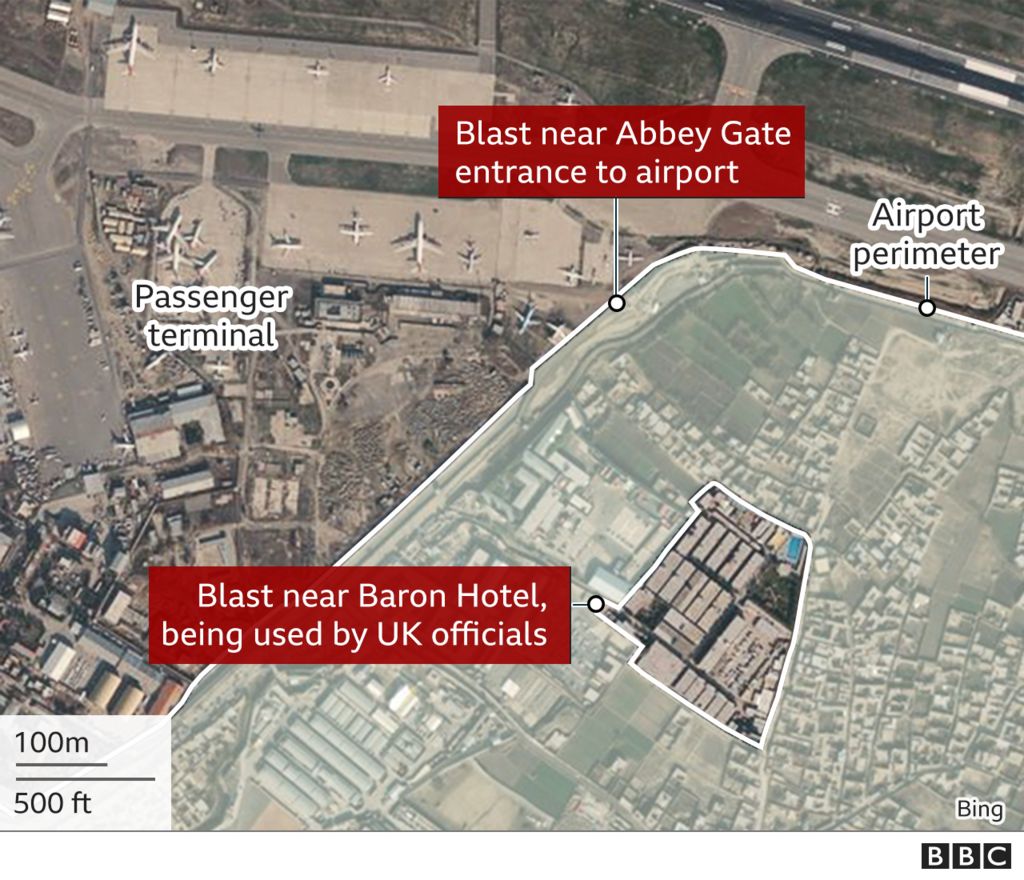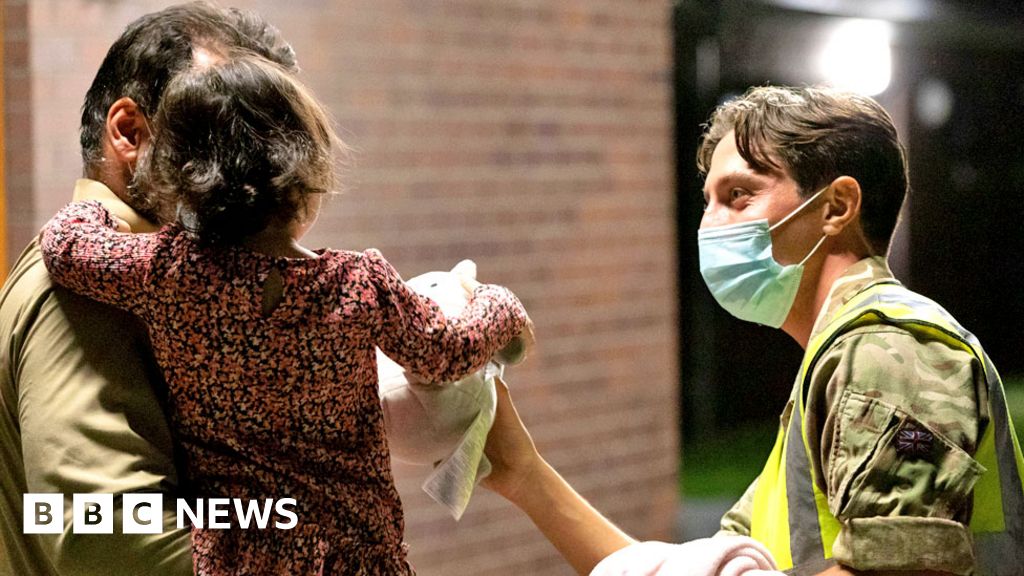The UK has entered the final stages of its Kabul evacuation and no more people will be called to the airport to leave, the Ministry of Defence says.
The MoD said processing facilities at the Baron Hotel, outside the capital’s airport, had been closed.
The defence secretary expressed “deep regret” that not everyone eligible had been evacuated, including around 800 to 1,100 Afghans and 100 to 150 Britons.
The US, which is running the airport, is withdrawing its troops by 31 August.
It comes after two explosions hit Kabul airport on Thursday, killing at least 90 people – among them 13 US military personnel.
At least 150 people were also wounded in the attack, which the so-called Islamic State group says it was behind.
But Defence Secretary Mr Wallace said the UK’s withdrawal “wasn’t hastened by the attack”.
On Friday morning, the MoD said 13,708 people had been evacuated by the UK from Kabul under Operation Pitting, which began on 13 August.
Mr Wallace said this included nearly 8,000 Afghans eligible under the UK’s relocation scheme for those who worked for the UK government and other vulnerable individuals, as well as 4,000 British passport holders.
Others evacuated include embassy staff and nationals from partner nations.
The defence secretary said the operation was “a remarkable achievement” in a “very hostile environment”.
But he told LBC Radio around 800 to 1,100 eligible Afghans would be left behind, as well as approximately 100 to 150 British nationals, some of whom he said were staying willingly.


Mr Wallace told BBC Breakfast eight to nine more flights would come into Kabul to evacuate around 1,000 people who remained inside the airfield.
He would not confirm when the last British troops would leave the country, but said this would be before the US withdrew by 31 August.

‘We have been left to die’
Among those who have been trying to flee the country is an English language trainer for the British Council, who worked with Afghan school teachers.
The man – who the BBC is not naming for his own safety – said he was told by the British Council to apply for the UK’s Afghan Relocations and Assistance Policy scheme because he worked directly for the British government.
He said he applied for the scheme but never heard back.
Since Afghanistan fell to the Taliban he has been in hiding with his family and said he felt he and dozens of colleagues had been “left to die by the UK government”.
“We see our colleagues dying every day. Our colleague was shot this week,” he told the BBC.
“Our only hope was to be able to evacuate and travel to the UK. But that didn’t happen. Right now we don’t know what to do.
“In return for our services to the UK, we have been gifted to the Taliban.”

While the evacuation operation from the airport is coming to an end, Mr Wallace told the Today programme the UK’s Afghan relocation scheme would remain open “indefinitely”.
He added that if eligible people were able to get to other countries, the UK could process them there.
The defence secretary said it was likely the Taliban would want to keep the airport functioning in the future and people may be able to leave by that route “in the medium term”.
Conservative MP Tom Tugendhat, who served in Afghanistan, said the military had done “an amazing job” but many people, including his own interpreter, would not get out of the country.
“I’m not giving up but my anger and shame for those we’ve left behind to be hunted by the Taliban is growing,” he said in a tweet.
Labour leader Sir Keir Starmer praised the “courage and heroism” of troops and officials who helped with the evacuation.
However, he said the UK government “must take its fair share of the responsibility” for people being left behind and “has serious questions to answer about how, despite having 18 months to prepare, their failure to plan and inability to influence others has contributed to this tragic political failure”.


With the deadline fast looming the British evacuation operation was always going to end soon.
Other European nations have already ended their rescue flights. But the attacks at the airport have made it more dangerous.
The Ministry of Defence says the decision to close the UK’s processing centre reflects the situation on the ground with “an ongoing and serious threat of terrorist attack at the airport”. It means no new cases will be processed.
Some of the 1,000 British troops on the ground have already left.
Defence Secretary Ben Wallace says some military equipment will have to be left behind.
As throughout this operation it is the United States that is dictating the sequence of this withdrawal. And it will be US forces, who have provided the bulk of the security, who will be the last to leave.

The MoD said closing processing facilities would enable the UK to focus efforts on evacuating those who were already at the airport ready to leave.
“The UK’s ability to process further cases is now extremely reduced and additional numbers will be limited,” it said in a statement.
“Evacuating all those civilians we have already processed will free up the capacity needed on UK military aircraft to bring out our remaining diplomats and military personnel.”
Mr Wallace said the risk of attacks by the Islamic State group in Afghanistan would increase as foreign forces left.
“I’m absolutely concerned that, until we’ve gone, there’s an absolute threat to our forces, and even after we’ve gone there’s a threat to the Afghan people from Isis,” he said.

What happens to Afghan refugees coming to the UK?
- Arrivals on official flights enter a 10-day Covid quarantine in a hotel
- Government officials and local authorities are trying to find them permanent homes
- A shortage of suitable accommodation means many will be placed in hotels
- Some will get refugee status and can live in the UK permanently
- Others will get a five-year visa to live and work in the UK – and can then apply for permanent residence
- Afghans arriving independently will enter the normal system for asylum claims – which has a backlog of 70,000 people
- These people cannot settle, or work, while their claims are considered


Are you in Afghanistan or do you have loved ones there? Please tell us your story by emailing haveyoursay@bbc.co.uk.
Please include a contact number if you are willing to speak to a BBC journalist. You can also get in touch in the following ways:
- WhatsApp: +44 7756 165803
- Tweet: @BBC_HaveYourSay
- Please read our terms & conditions and privacy policy
If you are reading this page and can’t see the form you will need to visit the mobile version of the BBC website to submit your question or comment or you can email us at HaveYourSay@bbc.co.uk. Please include your name, age and location with any submission.
